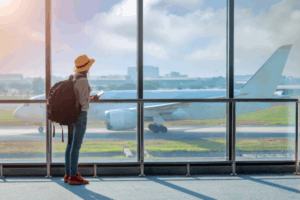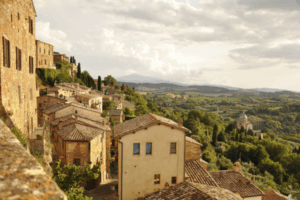In recent years, travellers have begun rethinking how they explore the world. Instead of rushing from landmark to landmark, snapping photos before moving on to the next destination, a new trend is gaining momentum: slow travel. Far from being just another travel buzzword, slow travel represents a shift in mindset – one that values depth over speed, immersion over ticking boxes, and meaningful experiences over quick getaways. As the tourism industry evolves, many believe slow travel is not just a passing fad, but the very future of how we journey.

What Exactly Is Slow Travel?
Slow travel is rooted in the broader “slow movement,” which started in the 1980s as a response to the increasingly fast-paced modern lifestyle. Applied to tourism, it means taking your time to connect with places, people, and cultures rather than rushing through an itinerary. Instead of trying to see five countries in ten days, a slow traveller might spend two weeks in one small town – exploring at a relaxed pace, shopping at local markets, and perhaps even learning the local language.
It’s about savouring the journey, not just the destination. Whether that’s travelling by train instead of flying, choosing homestays over luxury resorts, or enjoying a leisurely hike instead of joining a rushed tour, slow travel invites us to truly immerse ourselves in the experience.
The Benefits of Slow Travel
1. Deeper Cultural Connections
When you stay longer in one place, you get the chance to experience a destination as locals do. You might stumble upon a family-run café tucked away in a quiet neighbourhood, join in on community festivals, or strike up conversations with shopkeepers. These interactions offer more authenticity than hurried sightseeing ever could.

2. Reduced Stress
Traditional travel often leaves us exhausted – jet lag, strict schedules, and the pressure to “make the most” of every moment. Slow travel removes that stress. Instead of racing against the clock, you can take your time, sleep in, and let the days unfold naturally. Travelling becomes a source of restoration rather than fatigue.
3. Environmental Impact
Fast travel usually involves multiple flights, which contribute heavily to carbon emissions. Slow travel, by contrast, encourages sustainable choices: fewer flights, more local transport, and walking or cycling within destinations. It’s not only better for the planet but also allows travellers to experience the scenery in a richer, more intimate way.

4. Financial Advantages
Contrary to popular belief, slow travel can often be more budget-friendly. Staying in one place longer means you can rent apartments instead of hotels, cook some of your own meals, and avoid costly long-distance transfers. Over time, your money stretches further while your experiences deepen.
5. Personal Growth
By taking time to engage with your surroundings, you learn patience, adaptability, and appreciation for different ways of life. Slow travel fosters mindfulness – encouraging you to live in the moment rather than chase the next selfie opportunity.

Why the World Is Moving Towards Slow Travel
The pandemic played a significant role in reshaping how people think about travel. With borders closed and mobility restricted, many began exploring closer to home – discovering their own cities, countryside, and hidden local gems. This experience helped shift focus away from crowded, over-touristed landmarks and towards meaningful, mindful exploration.
Additionally, climate change concerns are influencing travel behaviour. Younger generations, particularly Gen Z and Millennials, are increasingly conscious of sustainability. They value eco-friendly options, community-based tourism, and ethical travel choices – all of which align perfectly with slow travel principles.
Digital fatigue is another factor. In a world where we are constantly connected and bombarded with information, slow travel provides a much-needed antidote. It offers the chance to disconnect, unwind, and reconnect with what truly matters.

How to Practise Slow Travel
You don’t need to completely abandon traditional tourism to embrace slow travel. Instead, you can adopt a few principles to enrich your journeys:
-
Stay Longer in Fewer Places: Instead of hopping from city to city, choose one destination and really explore it.
-
Use Local Transport: Trains, buses, bicycles, and even walking help you see places from a different perspective.
-
Engage with Locals: Shop at neighbourhood markets, take part in workshops, or volunteer in community projects.
-
Choose Accommodation Wisely: Opt for family-run guesthouses or eco-lodges that support local businesses.
-
Disconnect Digitally: Put your phone away, resist the urge to constantly post on social media, and focus on the present moment.
-
Eat Local: Skip global fast-food chains in favour of local delicacies cooked by regional chefs.
Examples of Slow Travel Destinations

Some destinations lend themselves particularly well to slow travel:
-
Tuscany, Italy: Rolling vineyards, rustic villages, and long farmhouse stays make Tuscany ideal for relaxed exploration.
-
Kyoto, Japan: Rather than rushing between temples, travellers can spend weeks soaking up traditions, tea ceremonies, and seasonal festivals.
-
Kerala, India: Known as “God’s Own Country,” Kerala offers backwaters, homestays, and Ayurveda retreats – perfect for unhurried travel.
-
New Zealand’s South Island: Scenic road trips, hikes, and small towns encourage travellers to take it slow and savour nature.
-
Portugal’s Algarve Coast: Beyond the tourist hotspots, charming fishing villages and quiet beaches provide an authentic, tranquil experience.
The Future of Tourism

Slow travel challenges the notion that travel must be about checking off lists. Instead, it redefines tourism as a transformative, mindful experience. As travellers increasingly value sustainability, authenticity, and wellbeing, slow travel is poised to become the dominant philosophy shaping the future of tourism.
Tourism boards, too, are beginning to recognise its importance. Many destinations now promote off-the-beaten-path experiences and encourage longer stays to combat over-tourism. As more travellers embrace this style, we may see the industry shift towards smaller-scale, community-focused tourism initiatives.
Conclusion
Slow travel is not simply about moving at a leisurely pace; it’s a movement towards more responsible, meaningful, and enriching journeys. By choosing to immerse ourselves rather than skim the surface, we not only benefit personally but also support local communities and reduce our environmental footprint.
As the world continues to change, one thing is clear: slow travel is more than a trend – it is the future of tourism.

Explore TBTD Today!
Grab the Best Flight Deals Now
Grab the Best Hotel Deals Now
Grab the Best Car Rental Deals Now
Grab the Best Bus Ticket Deals Now
Grab the Best Airport Transfer Deals Now
Grab the Best Adventure Tour Deals Now
Grab the Best Train Ticket Deals Now
Grab the Best Cruise Ticket Deals Now
Explore AP Today for the Best Discounts & Promotions across Asia!
Explore ES Today for the Best Discounts & Promotions across Europe!

